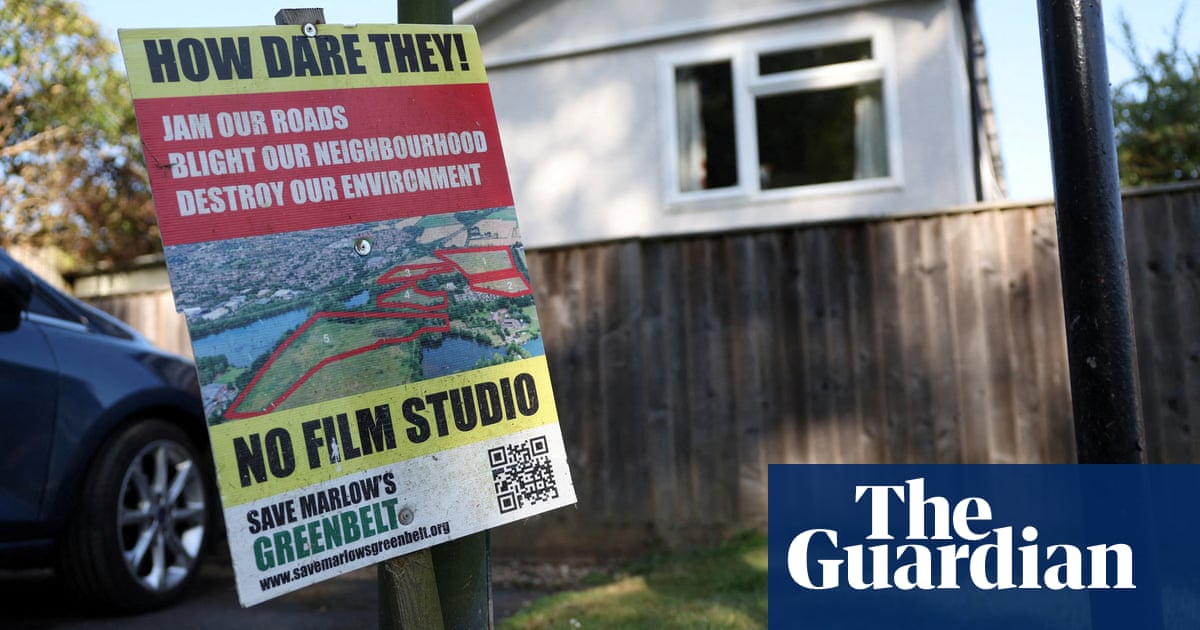
The deputy prime minister, Angela Rayner, has called in a rejected planning application for a multimillion-pound film studio development in what is being closely watched as a test of Labour’s appetite to prioritise economic growth in the creative industries.
A proposed £750m development at Marlow Film Studios that would have created 4,000 jobs was turned down by Buckinghamshire council in May, citing concerns about the impact on the road network and use of the green belt.
The project has received high-profile backing from film-makers including 1917 director Sam Mendes, and James Cameron, the Hollywood director of Titanic and Avatar. The site would have 44,000 sq metres (470,000 sq ft) of new soundstages.
The developers lodged an appeal but now Rayner, as secretary of state for housing, communities and local government, has called in the planning decision. Ministers will now ultimately determine whether the studio development is approved. Rayner has spoken about the need to unblock and overhaul the planning system in the green belt.
The culture secretary, Lisa Nandy, has said the Labour government views the creative industries as a key part of the economy, generating £125bn a year. This week she confirmed that the independent film tax credit scheme giving tax relief to independent film productions would go ahead.
Marlow Film Studio welcomed Rayner’s decision. “This is a project of national importance. The UK’s film and TV industry leads the world,” it said.
A second film studio development planned for the green belt is also mired in the planning system.
Holyport Studios, a £100m scheme proposed by Greystoke Land, would provide 20,900 sq metres of soundstage space, divided between 15 stages, along with a 1.1-hectare (2.9-acre) backlot, a virtual reality and games facility, and would create an estimated 350 direct on-site jobs when in full operation, as well as an estimated 1,400 jobs for the local area, according to the developer.
The Royal Borough of Windsor and Maidenhead refused the development in March, but Greystoke has appealed, and the independent Planning Inspectorate, which deals with applications and appeals in England, is due to hold an inquiry into the plans next month.
The concil refused Greystoke’s application in March, claiming the development would be inappropriate for the green belt and would harm the character of the area.
Sources close to both schemes expressed hope that the political backdrop has improved given the Labour government’s commitment to reform the planning system and statements about the importance of the film and TV industry. In a speech earlier this year to Labour creatives, Keir Starmer said: “What we make and produce is known and loved in every corner of the globe.”
Film studio space in the UK has doubled in the past three years from 297,000 sq metres in 2019, to 492,000 sq metres in 2022-23, according to UK government figures that suggest at the current rate of expansion Britain will be second only to Hollywood globally by the end of 2025.
Under the appeals process, the Planning Inspectorate can conduct an inquiry (or hearings) and the secretary of state has the power to determine an appeal or recover an appeal at any stage until the planning inspector has issued their decision. Any further appeal would then be through a judicial review application to the high court.
In theory, the secretary of state can call in a planning application for any reason, but in practice very few applications are called in each year. Between 2010-2011 and 2022-2023, the secretary of state called in 198 planning applications.
after newsletter promotion
Cases that qualify include those that may conflict with national policy or those that could have significant effects beyond their immediate locality. Each case is considered on its individual merits.
Sam Kershaw of campaign group Save Marlow’s Greenbelt is opposed to the proposed studio. “We expect the forthcoming planning inquiry to reveal that the economic benefits would be negligible and we hope that Angela Rayner will then decide that this is not a good use of green belt land as it will do nothing to generate growth or fix the housing crisis,” he said.
He said he feared that the studio’s backers had been lobbying the government to approve their appeal in the hope that proposed changes to the green belt regulations would work in their favour.
Planning consents for new film studios increased by 45% between 2018 and 2021, while applications were up by 35%, according to a 2022 reportby the property consultancy Knight Frank. However, demand has been hit by last year’s Hollywood strikes by writers and actors, and there have been suggestions that there may now be too much space.
Peter Strachan, Buckinghamshire council’s cabinet member for planning, said: “We will be robustly defending the decision of the council as the local decision maker to refuse this application in evidence to the appointed inspector at the inquiry and the secretary of state, and will urge them to fully consider the significant local concerns.”
The Ministry for Housing, Communities and Local Government said: “[the ministry] has recovered an appeal by Dido Property Ltd for film studios and associated works at Little Marlow, Buckinghamshire. We cannot comment further at this stage.”
Source: theguardian.com





















